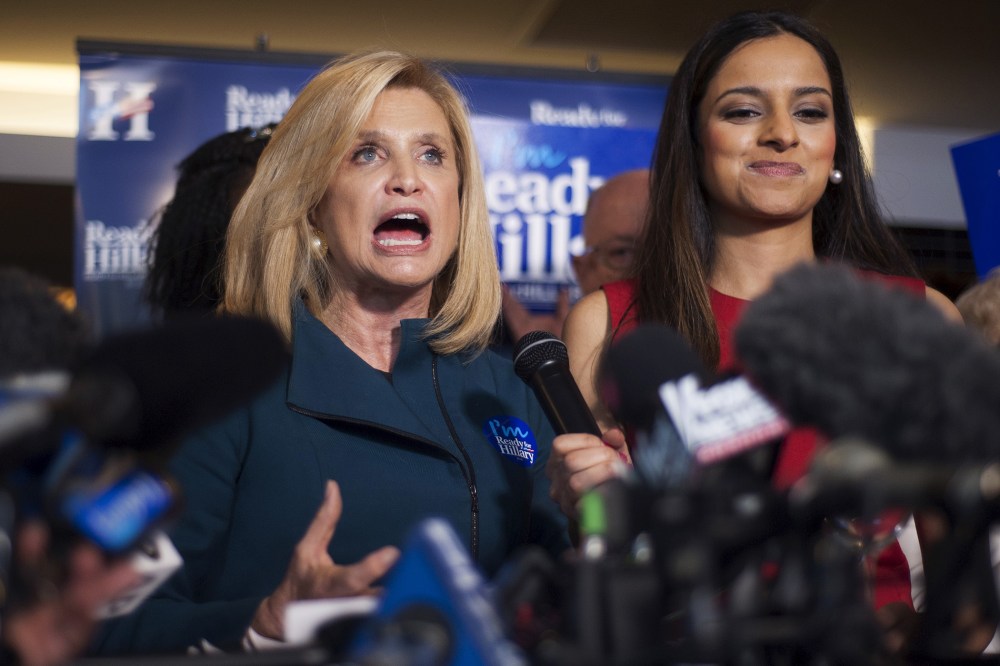Rep. Carolyn Maloney was pregnant and terrified that if she told she’d lose her job.
It was the 1980s and the New York Democrat’s career was on the rise as senior staffer in the state Senate’s minority leader’s office, but there were others, men mostly, jockeying to take her place.
And, as she wrote in her book, “Rumors of our Progress Have Been Greatly Exaggerated”, the state Senate’s human resources representative “wasn’t even polite” when asked about leave options. So Maloney got creative and asked a friend of hers to fill in while she was out.
“I remember being scared that I would lose my job when telling my boss I was pregnant with my first child and this jolted something in me,” she told NBC News.
She realized that the attitude toward women and politics had to change, but not without women being a “part of the conversation.” She would later become the first woman elected to Congress from her district after she defeated 15-year incumbent Bill Green for his seat in Congress.
RELATED: Six women politicians shifting the local political landscape
She was elected to congress in 1992—the so-called “year of the woman”, a period when a historic number of women were elected to the U.S. Senate. The next year she supported the Family and Medical Leave Act (FMLA) of 1993, signed into law by President Bill Clinton.
“While we have made great strides, there is still systemic discrimination in our society,” Maloney said.
It is an experience and perspective women elected to office and interviewed by NBC News on the topic said they share.
There is “not a supply problem but a demand problem,” said Jennifer Lawless, a professor at George Washington University.
“When women run, they do just as well as men. Female incumbents are re-elected at the same rate as male incumbents. Female challengers win just as much as male challengers,” Lawless said she found when researching her 2010 book “It Still Takes a Candidate: Why Women Don’t Run for Office”.
The issue is getting women to run for office in the first place.
“Over time, political scientists have moved away from the theory that voters wouldn’t elect women,” Sanbonmatsu said. “That idea doesn’t seem to be the problem.”
According to Poised to Run: Women’s Pathways to the State Legislatures, an analysis from Rutgers’ Center of American Women and Politics, female political hopefuls struggle in two key areas: political ambition and attracting party support to utilize resources.
Cate Gormley of Lake Research Partners: for women cands, likability and qualifications are tied. #R2RNJ pic.twitter.com/2IbvFfKMgm
— CAWP (@CAWP_RU) March 18, 2016
But studies show that women are less likely to envision themselves as running for office compared to men. In a 2008 Center of American Women and Politics study of candidate recruitment, 53 percent of women polled agreed that they had not seriously thought about running until someone else suggested.
By comparison, 43 percent of men who responded said it was “entirely their idea to run”.
Though there is a pool of qualified men and women in high levels of education and political involvement “political socialization in childhood, in schools and in society at large” leads to a difference between the two genders in self-perception, said Gina Woodall, lecturer at Arizona State University.
“Women don’t want to take the ‘plunge’ to run for office at the same rate as men do,” Woodall said.
Women holding some of the nation’s highest elected offices say they’d love to increase their ranks.
“Women have a lot to offer in leadership positions — not only for the value they bring, but to be that role model for the next generation of women leaders,” McMorris Rodgers said. “People often say women are better listeners, trustworthy, problem solvers. We want to get things done. Whether it’s Congress or the executive suite, women need to be at the table.”
RELATED: Jimmy Kimmel ‘mansplains’ how to speak, dress to Hillary Clinton
She added that she is “fortunate” to have had such models that encouraged her to seek opportunities and take risk.
However, even when women do seek public office they often run into challenges.
“People still think they should be relegated to domestic kinds of activities,” Rep. Frederica Wilson, D-Florida, told NBC News, The glass ceiling for women continues to exist, she said, because “of the perception that a woman’s place is in the home, not in politics or even being employed.”
It is a problem that goes far beyond politics.
Women are doing well at building their own campaigns but the lower numbers of women running for office is a reflection of a glass ceiling of across professions, said Michele Swer, an American government professor at American University.











